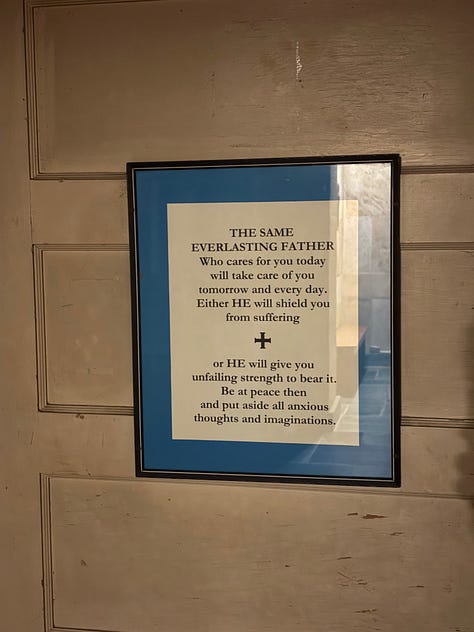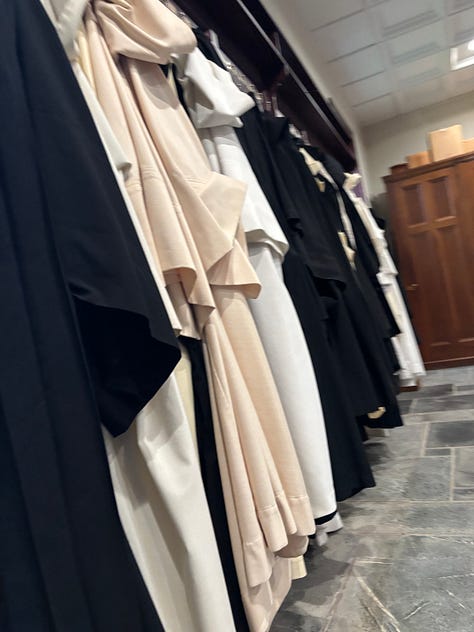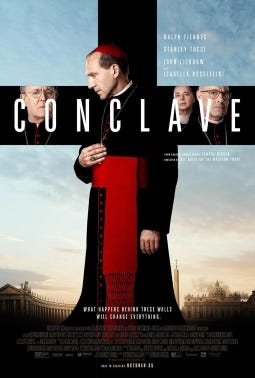Conclave and the Virtue of Humility
Someone once said, “Kim, there’s people that are dying.” This was Kourtney Kardashian to her sister when that sister, Kim, lost a diamond earring while swimming on vacation in Bora Bora.
It’s a sentiment at the heart of the recently released Conclave, written by Peter Straughan and directed by Edward Berger.
I don’t remember what movie I was sitting for, but I remember how captivated I was when I first saw the trailer. Then I went home and watched the trailer a few more times, and a few more times over the proceeding weeks and months. Conclave looked stylish, tasteful, and electrifying. Not to mention it starred Stanley Tucci and Ralph Fiennes, both of whom I have loved for nearly as long as I’ve watched movies (in fact, I probably watched The Devil Wears Prada and Schindler’s List around the same age). I have been waiting for Conclave for months.
So, try to imagine my surprise to learn that, just as it was rolling out into cinemas, it had sparked controversy of the political variety. Don’t spend too much time imagining. In hindsight, it should not have shocked me that a film about an election, of any kind, during an election year, or any year in America, would be political. Neither should it have shocked me that a film about the papacy in the time of one so shamelessly, pointlessly politicized as Francis’ would be political.
Like, duh.
I don’t think of myself as being necessarily on the frontlines of political news, much less of politics in and of itself. I get the news, yeah, I get the gossip, I get the clips of butchered families and the articles with recent tallies of the tens of thousands of deaths in [Choose Your Own Atrocity Adventure]. I put my cardigan on one sleeve at a time, just like everyone else. But with particular regard to the news cycle surrounding the ongoing presidential election, I tend to think of keeping an eye on things as being like keeping an eye on the stovetop kettle. You know it’s there, it’s on, and it is going to scream at you. Keep informed, but keep it together, too.
So, I took a trip to the movies.
Conclave was everything I hoped it would be and more. It has the style, the intrigue, the melodrama, and a soundtrack to boot, but what’s more, it has an intricately humble heart at its center. In its portrayals of the cardinals as humans—important humans, but human just the same—and of the Church as a living, breathing institution, the story’s grasp on its characters and setting is at once firm and gentle, practically caring. This is best expressed in the character of Thomas Lawrence, played masterfully by Fiennes. He is one of the “liberal” cardinals vying for a candidate with similar ideals as the late pope. He is also the Dean of the College of Cardinals, which means the responsibility for running the conclave falls entirely on him. All this after a recent crisis of faith—not in God, Lawrence says, but in the Church.
Then there’s the supporting cast of cardinals:
Tucci plays Aldo Bellini, an American cardinal and another liberal, one that’s a frontrunner for next pope, but there’s more brewing behind those big beautiful Italian-American eyes;
John Lithgow’s Joseph Tremblay gets less screen time than both, but he is really the Cady Heron to Fiennes’ Regina George if Regina was a well-meaning Vatican official and Cady was the Mean Girl, which is to say he is a middle-of-the-road conservative with general appeal but a scheming underbelly;
Lucian Msamati plays Joshua Adeyemi, a fiscally liberal but socially conservative cardinal and one of, I think, the most compelling characters in the whole movie;
Sergio Castellitto is nearly fearsome as Goffredo Tedesco, a brutal conservative who runs for pope on what can only be described as an anti-Vatican 2 platform, and then some;
and lastly, Carlos Diehz as Vincent Benitez, the latest addition to the College of Cardinals, whose inclusion in the conclave is last-minute in the truest sense.
My only criticism of Isabella Rossellini as Sister Agnes is not of her but of the production, for which she is underutilized. Brían F. O'Byrne and Balkissa Souley Maiga are similarly excellent in their respective minor roles.
What else can I really say? It’s a very good movie, and you should see it.
I refuse to include much, if any, more about the plot or characters (but boy, oh boy, I hit the nail on the head when I imagined it would be electrifying. It is! It really is). Truly, this is a film one must see to appreciate, either to love or to loathe. If you can help it, don’t let the ending be spoiled for you. Go! Run to the nearest theater as fast as you can! Don’t let it be spoiled, because as the reveal is laid before Cardinal-Dean Lawrence, so will it be laid before you, and you and Lawrence will each have to decide how you will receive the information and how you will act (not how you will react, take note).
You can practically see the questions etched into Lawrence’s eyes: Will he act with loyalty to the Church? to the Pope? to God the Creator who paints a wild stroke and loves so foolishly it baffles us in every age? Or with loyalty to his own vanities, politics, and godless fears?
It reminds me of a recurring sentiment I have found across my visits to Benedictine and Cistercian monasteries. Many monks have expressed in one way or another a longing for the pre-Vatican II Tridentine Mass. I do not believe this is said to oppose or deride the Novus Ordo or to question the authority of the Second Vatican Council. My working theory is twofold.
Firstly, the majority of today’s monks grew up either during or immediately after the shift from the Tridentine Mass to the Mass of Paul VI, or Ordinary Form, and there seems to be a real sense of FOMO (Fear Of Missing Out) of and disconnect from their older monastic brethren who “got” to experience the Tridentine Mass.
Additionally, it isn’t exactly the job of a contemplative monk or nun to foster a lay person’s active and devout participation in the Mass. It is their job to pray, point-blank, period. The abbey is not a parish, and the abbot is not a bishop. The only sheep the monastic shepherd is immediately responsible for are his monks. Because of this, the Tridentine Mass, which is focused solely on the worship of God and exercise of the Eucharist—rather than on these things and the enrichment of lay Catholics’ spiritual lives—seems to make more sense in the greater Benedictine design.
All of this being said, I have not come across a single monk in a single abbey that would dream of defying Rome on the matter of the Mass. The Benedictine order has been called an order without order; they fight the pope when it behooves them and they compromise; but through all things, they remain faithful to the Church. Monks, like their brother and sister religious, vow obedience. Saint John’s Abbey in Collegeville, MN, explains on their website:
[W]e promise obedience. Obedience flows in many directions in a Benedictine monastery, for "obedience" literally means "listening," paying attention to the varied ways that Christ calls us into a deeper relationship with him and each other. As Benedictines, we obey—we pay attention to—our Abbot, the principal teacher in our monastery. We obey each other, for there is always something to learn from the example of our brothers in the community, and from the men and women we meet daily in our work. Ultimately, obedience means being accountable to someone other than ourselves—not just to God, but to the flesh and blood people we live with every day. In them, too, we meet Christ.
Conclave is a fabulous, juicy little gossip-fest, but so much more importantly, it is a movie about humility. Humility is a virtue at the center of Benedictine spirituality and at the heart of Francis’ papacy, and it must be at the center of, if there is to be one, the future of the Church. In a 2020 article for the National Catholic Reporter on “gender ideology,” Dan Horan, who was a Franciscan at the time, writes:
As we continue to learn more from natural and social sciences about the wondrous diversity of God's creation, including the manifold experiences and identities within the human family, all members of the church—but especially those entrusted with leadership—must approach such new understandings with humility.
When we fail to respond in humility, we risk failing to respond with love, and the stakes are simply too high to respond with anything else.
Controversial as it might be, Conclave does not pose a threat to the Catholic Church. It poses a challenge. One could argue it is the same one Jesus posed to the religious leaders of his time. The challenge is to meet the law, and the question, then, is how will [we] meet the law? Will we meet it with a log in our eye, or will we meet it with love?
Whatever the case may be, God, the next time we’re about to squabble over gender neutral bathrooms, help us remember that, Kim, there’s people that are dying.
Highlights from the last week:
Voting, God help us and save us all
Reuniting with my car
Celebrating Halloween in Memphis, TN, with my friend Morgan
Returning to my beloved, Waffle House
Taking a detour to the Shrine of the Most Blessed Sacrament
Monasteries visited:
Saint Bernard Abbey, Cullman, AL
Monastery of the Poor Clare Nuns of Perpetual Adoration at the Shrine of the Most Blessed Sacrament, Hanceville, AL
Saint Joseph Abbey, St. Benedict, LA













